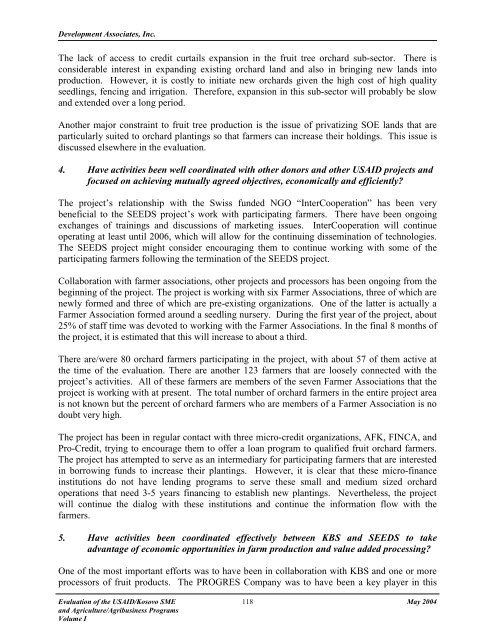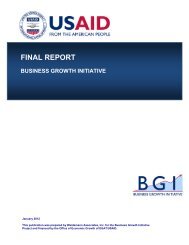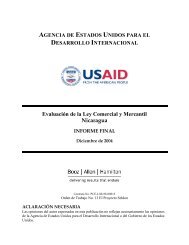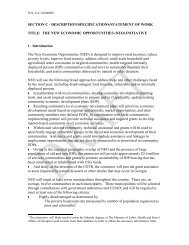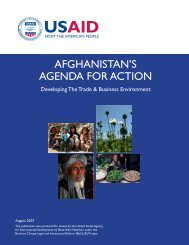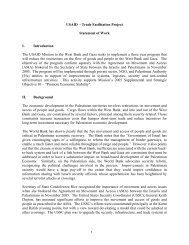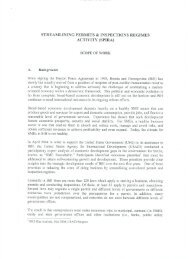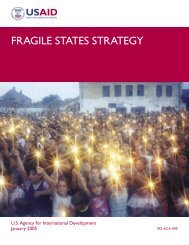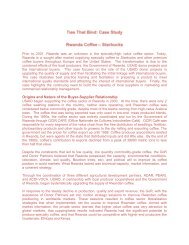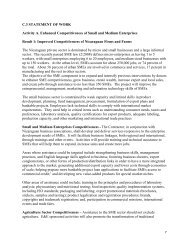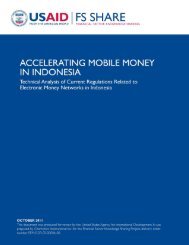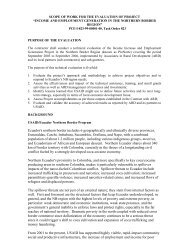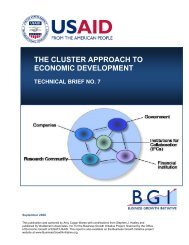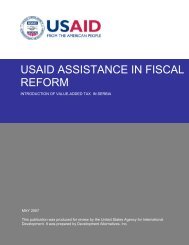Evaluation of the USAID-Kosovo SME and Agriculture - Economic ...
Evaluation of the USAID-Kosovo SME and Agriculture - Economic ...
Evaluation of the USAID-Kosovo SME and Agriculture - Economic ...
Create successful ePaper yourself
Turn your PDF publications into a flip-book with our unique Google optimized e-Paper software.
Development Associates, Inc.The lack <strong>of</strong> access to credit curtails expansion in <strong>the</strong> fruit tree orchard sub-sector. There isconsiderable interest in exp<strong>and</strong>ing existing orchard l<strong>and</strong> <strong>and</strong> also in bringing new l<strong>and</strong>s intoproduction. However, it is costly to initiate new orchards given <strong>the</strong> high cost <strong>of</strong> high qualityseedlings, fencing <strong>and</strong> irrigation. Therefore, expansion in this sub-sector will probably be slow<strong>and</strong> extended over a long period.Ano<strong>the</strong>r major constraint to fruit tree production is <strong>the</strong> issue <strong>of</strong> privatizing SOE l<strong>and</strong>s that areparticularly suited to orchard plantings so that farmers can increase <strong>the</strong>ir holdings. This issue isdiscussed elsewhere in <strong>the</strong> evaluation.4. Have activities been well coordinated with o<strong>the</strong>r donors <strong>and</strong> o<strong>the</strong>r <strong>USAID</strong> projects <strong>and</strong>focused on achieving mutually agreed objectives, economically <strong>and</strong> efficiently?The project’s relationship with <strong>the</strong> Swiss funded NGO “InterCooperation” has been verybeneficial to <strong>the</strong> SEEDS project’s work with participating farmers. There have been ongoingexchanges <strong>of</strong> trainings <strong>and</strong> discussions <strong>of</strong> marketing issues. InterCooperation will continueoperating at least until 2006, which will allow for <strong>the</strong> continuing dissemination <strong>of</strong> technologies.The SEEDS project might consider encouraging <strong>the</strong>m to continue working with some <strong>of</strong> <strong>the</strong>participating farmers following <strong>the</strong> termination <strong>of</strong> <strong>the</strong> SEEDS project.Collaboration with farmer associations, o<strong>the</strong>r projects <strong>and</strong> processors has been ongoing from <strong>the</strong>beginning <strong>of</strong> <strong>the</strong> project. The project is working with six Farmer Associations, three <strong>of</strong> which arenewly formed <strong>and</strong> three <strong>of</strong> which are pre-existing organizations. One <strong>of</strong> <strong>the</strong> latter is actually aFarmer Association formed around a seedling nursery. During <strong>the</strong> first year <strong>of</strong> <strong>the</strong> project, about25% <strong>of</strong> staff time was devoted to working with <strong>the</strong> Farmer Associations. In <strong>the</strong> final 8 months <strong>of</strong><strong>the</strong> project, it is estimated that this will increase to about a third.There are/were 80 orchard farmers participating in <strong>the</strong> project, with about 57 <strong>of</strong> <strong>the</strong>m active at<strong>the</strong> time <strong>of</strong> <strong>the</strong> evaluation. There are ano<strong>the</strong>r 123 farmers that are loosely connected with <strong>the</strong>project’s activities. All <strong>of</strong> <strong>the</strong>se farmers are members <strong>of</strong> <strong>the</strong> seven Farmer Associations that <strong>the</strong>project is working with at present. The total number <strong>of</strong> orchard farmers in <strong>the</strong> entire project areais not known but <strong>the</strong> percent <strong>of</strong> orchard farmers who are members <strong>of</strong> a Farmer Association is nodoubt very high.The project has been in regular contact with three micro-credit organizations, AFK, FINCA, <strong>and</strong>Pro-Credit, trying to encourage <strong>the</strong>m to <strong>of</strong>fer a loan program to qualified fruit orchard farmers.The project has attempted to serve as an intermediary for participating farmers that are interestedin borrowing funds to increase <strong>the</strong>ir plantings. However, it is clear that <strong>the</strong>se micro-financeinstitutions do not have lending programs to serve <strong>the</strong>se small <strong>and</strong> medium sized orchardoperations that need 3-5 years financing to establish new plantings. Never<strong>the</strong>less, <strong>the</strong> projectwill continue <strong>the</strong> dialog with <strong>the</strong>se institutions <strong>and</strong> continue <strong>the</strong> information flow with <strong>the</strong>farmers.5. Have activities been coordinated effectively between KBS <strong>and</strong> SEEDS to takeadvantage <strong>of</strong> economic opportunities in farm production <strong>and</strong> value added processing?One <strong>of</strong> <strong>the</strong> most important efforts was to have been in collaboration with KBS <strong>and</strong> one or moreprocessors <strong>of</strong> fruit products. The PROGRES Company was to have been a key player in this<strong>Evaluation</strong> <strong>of</strong> <strong>the</strong> <strong>USAID</strong>/<strong>Kosovo</strong> <strong>SME</strong> 118 May 2004<strong>and</strong> <strong>Agriculture</strong>/Agribusiness ProgramsVolume I


